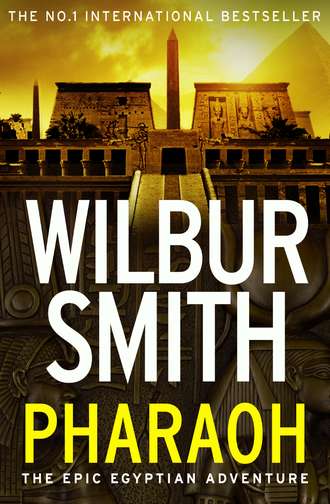
Полная версия
Pharaoh
During the ensuing long days as we rowed northwards down the river towards the sea the prince and I had plenty of time to renew our acquaintance.
The next pressing decision we had to make was to decide our ultimate destination once we had left Egypt. It seemed that Rameses had conceived the horrifying notion of sailing out through the rocky Gates of Hathor at the end of the world – just to see what lay beyond them. I knew very well what lay beyond. The great nothingness lay beyond. If we were so ill advised as to take that course we would simply drop off the end of the world and fall in darkness through all eternity.
‘How do you know that is what will happen to us?’ Rameses demanded of me.
‘Because nobody has ever returned from beyond the Gates,’ I explained quite reasonably.
‘How do you know that?’ he wanted to know.
‘Name me one who has,’ I challenged him.
‘Scaeva of Hispan.’
‘I have never heard of him. Who was he?’
‘He was a great explorer. My great-grandfather met him.’
‘But did you ever meet him?’
‘Of course not! He died long before I was born.’
‘So your great-grandfather told you about him?’
‘Well, not really. You see he also died before I was born. My own father told me the story of Senebsen.’
‘You know how much I respect the memory of your father; however, I never had the opportunity to discuss this Senebsen’s travels with him. Moreover, I doubt I would have been sufficiently convinced by third-hand accounts of what lies beyond the Gates to take the risk of travelling there myself.’
Most fortuitously I had a dream two nights later. I dreamed that the princesses Bekatha and Tehuti together with all their multitudinous children had been captured by Farsian pirates and chained to a rock at the edge of the sea as an offering to appease the terrible sea monster which was known as the Tarquist. This creature has wings with which it is able to fly through the air like a great bird or swim through the sea like a mighty fish. It also has fifty mouths which are insatiable for human flesh and with which it is able to destroy even the greatest ships ever built by men.
Naturally I was extremely reluctant to tell Rameses of my dream, but in the end I had to take into account the solemn duty I had sworn to the royal house of Egypt. Of course, Rameses was fully aware of my reputation as a soothsayer and a reader of dreams. He listened quietly but seriously to my own interpretation of the dream, then without giving his own opinion he went to the bows of the ship where he sequestered himself for the remainder of the afternoon. He came back to me in the poop as the sun was setting, and wasted no words.
‘I charge you most strictly to tell me the truth about what happened to my two aunts when they were sent by my father, Pharaoh Tamose, to the Empire of Crete to become the wives of the Great Minos, the King of Crete. I understood that they carried out their duty as my father decreed and they became the wives of the Minos, but then they were killed in the violent eruption of Mount Cronus. This is what my father told me. But then I was present when my brother Utteric accused you of treachery and false pretences. He says that my aunts survived the volcanic eruptions which killed their husband, the Minos, but then they neglected their duty and rather than returning to Egypt they eloped with those two rogues Zaras and Hui and disappeared. I discounted Utteric’s accusations as the ravings of a lunatic, but now this dream of yours seems to endorse the notion that they are still alive.’ He broke off and regarded me with that piercing gaze of his. ‘Tell me the truth, Taita,’ he challenged me. ‘What really happened to my aunts?’
‘There were circumstances?’ I hedged at the direct question.
‘That is no answer,’ he chided me. ‘What do you mean by There were circumstances.’
‘Please let me give you another example, Rameses.’
He nodded. ‘I am listening.’
‘Suppose a prince of the royal house of Egypt becomes aware that his elder brother who is Pharaoh was intent on murdering him for no good reason, and he decided to flee his country rather than stay and be killed. Would you consider that to be dereliction of his duty?’ I asked, and Rameses rocked back on his heels and stared at me in astonishment.
At last he shook his head as if to clear it, and then said softly, ‘You mean, would I count that as extenuating circumstances?’
‘Would you?’
‘I suppose I would,’ he admitted, and then he grinned. ‘I suppose I already have.’
I seized upon his admission. ‘Very well. I will tell you about your two aunts. They were lovely girls, loyal and true as well as clever and very beautiful. Your father sent them to Crete as brides of the Minos. I was appointed their chaperon. They did their duty to your father and to Egypt. They married the Minos despite the fact they were in love with men of their own choice. Then the Minos was killed in the eruption of Mount Cronus and suddenly they were free. They eloped with the men they truly loved, and rather than discouraging them I assisted them.’
He stared at me in fascination as I went on, ‘You were correct in your suspicions. Both your aunts are still alive.’
‘How do you know that?’ he demanded of me.
‘Because, not more than a month ago, I discussed the subject with their husbands. I want you to come with me to visit them. You can travel incognito, as the captain of the Memnon, not as a prince of the royal house of Tamose. Then you will be in a position to judge them and compare their decision to disappear to your own decision to do exactly the same thing.’
‘What if I still think that my aunts reneged on their royal duty?’
‘Then I will sail with you through the Gates of Hathor and jump with you over the edge of the world into eternity.’
Rameses let out a shout of laughter, and when he regained his composure he wiped the tears of merriment from his cheeks and asked, ‘Do you know where to find these two elusive ladies?’
‘I do.’
‘Then show us the way,’ he invited me.
Two days later we reached the mouth of the Nile without further serious delays. The Hyksos fleet was destroyed, and there was no other ship afloat that dared challenge our right of way, for the Memnon ruled the river just as her namesake had ruled the land. The Middle Sea lay ahead of us. We passed out through the Phatnic mouth, the largest of the seven mouths of the River Nile, and my heart rejoiced within me to ride once more the waves of the greatest of all oceans.
I knew that on the northerly course we had to take we would be out of sight of the land for days and possibly even as long as a week at a time. At this season of the year the clouds would probably blot out the sun for days on end. Navigation was always a problem in these circumstances, so it was time to show Rameses my magic fish. This had been given to me many years ago by an African medicine man. I had saved his eldest son from death by snakebite and his gratitude had been fulsome.
This magic fish is carved out of a rare and weighty type of black stone found only in Ethiopia above the last Nile cataract. It is known to the tribesmen as the ‘going-home stone’, for with it they are able to find their way home. There are many that disparage the wisdom of the black tribesmen, but I am not one of those.
My magic fish is about as long as my little finger but merely a sliver thick. When needed I glue it to a piece of wood carved to the shape of the hull of a boat. This miniature boat with the fish on board is floated in a round bowl of water. The bowl must also be made of wood and decorated with esoteric African designs in vivid colours. Now comes the magical part. The carved stone fish swims slowly but doggedly towards the northernmost point on the bowl’s circumference, no matter in which direction the bows of the ship are pointed. On this leg of our voyage we had only to point the bows of the Memnon slightly to the left of the direction in which the nose of the fish was aiming. Night or day the magical fish is infallible. On our return journey we would simply point the Memnon’s nose in the reciprocal direction; that is always supposing that we would ever have call to return to Egypt.
Rameses scoffed at my little fish. ‘Can it also sing an ode to the gods, or fetch me a jug of good wine, or point the way to a pretty girl with a cunny that tastes sweet as honey?’ he wanted to know. I was deaf to such unbecoming levity.
Our first night on the open sea the sky was obscured completely by cloud. There was no sun, moon or stars to guide us. We sailed all night in Stygian darkness with only the going-home stone to show us the way. Long before dawn the two of us went up on deck and sat over the wooden bowl, watching it in the feeble light of a sputtering oil lamp. Rameses passed the time by making more of his little jokes at my expense. He was mortified when the day broke and the clouds cleared to reveal that the Memnon and my little fish were holding the precise course slightly west of north.
‘It really is magic,’ I heard him mutter to himself when this happened the third morning in succession. Then on the fourth morning, as the sun pushed its fiery head above the horizon, the blighted island of Crete lay not more than five leagues dead ahead of our bows.
Many years previously, when I first laid eyes on them, the mountains of Crete had been green and heavily forested. Great cities and ports had marked the island’s shores as the most prosperous in the world. The waters around its coast had teemed with shipping: both men-of-war and cargo ships.
Now both forests and cities had gone, scorched to blackened ashes by the fiery breath of the great god Cronus, who in a fit of pique had destroyed the mountain wherein his own son Zeus had enchained him; blowing it apart in a fiery volcanic eruption. The remains of his singular mountain had sunk beneath the waters, leaving not a trace of its previous existence. We altered course and sailed in as close to the land as seemed safe, but I could recognize no features that had previously existed. Even after all these years the air still reeked of sulphur and the odour of dead things, both animals and fishes. Or perhaps that was really only my vivid imagination and my keen sense of smell. In any event the waters under our keel were devoid of life; the coral reefs had been killed off by the boiling sea. Even Rameses and his crew, who had never known this world, were subdued and appalled by such total destruction.
‘This bears abundant testimony to the fact that all the strivings of man are trivial and insignificant in the face of the gods.’ Rameses spoke in a hushed voice. ‘Let us hurry away from this place and leave it to the apocalyptic anger of the god Cronus.’
So I ordered the helmsman to put the rudder over and increase the beat. We bore away northwards into the Grecian Sea, still sailing a few points west of true north.
For me these were unexplored waters into which we were sailing. Crete was as far north as I had ever ventured. Within a day we had passed out of the area laid waste by the volcano and the sea resumed its friendly and welcoming aspect. Rameses had a quick and enquiring mind. He was eager to learn and I was pleased to accommodate him. He wanted particularly to know all I could tell him about his family history and origins, about which I knew a great deal. I had lived with four generations of Pharaohs at first hand. I was pleased to be able to share my knowledge with him.
But we were not so involved with the history of Egypt that we neglected our duties as commanders of the finest warship afloat. The time that we spent in examining the past was as nothing compared to that we spent preparing for future contingencies. As befitted a ship of its class, the crew had all been handpicked by Rameses and were as fine a bunch of men as I had ever seen in action, but I have always believed in improving upon perfection if it is even remotely possible. Rameses drilled his men pitilessly, and I assisted him in keeping them up to the highest levels of training.
The very best military commanders have an instinct for danger and the presence of an enemy. By noon of the third morning after we had left the island of Crete behind us I began to experience the familiar nameless unease. I spent much of my afternoon surreptitiously searching the horizon not only ahead of the ship but behind us as well. I knew from experience that it was dangerous to ignore these premonitions of mine. Then I saw that I was not alone in my unease. Rameses was becoming restless also, but he could not hide his concern as well as I was able to do so. He was of course much less experienced than I was. In the late afternoon, when the sun was only a hand’s span above the western horizon, he laid his sword and helmet aside and clambered to the top of the mainmast. I watched him staring back over our wake for a while, and then I could contain myself no longer. I also divested myself of my weapons and half-armour and went to the foot of the mast. By this time the crew and especially those taking their turn at the long oars were watching me with interest. I climbed from the main deck to the crow’s nest at the peak without pausing and Rameses made room for me although it was a tight squeeze for the two of us in the bucket of the crow’s nest. He said nothing but regarded me curiously for a while.
‘Have you spotted him yet?’ I broke the silence and he looked startled.
‘Have I spotted whom?’ he asked carefully.
‘Whoever it is that is shadowing us,’ I replied, and he chuckled softly.
‘So you have sensed them also. You are a sly old dog, Taita.’
‘I didn’t get to be an old dog by being stupid, young man.’ I am sensitive to references to my age.
Rameses stopped laughing. ‘Who do you think it is?’ he asked more soberly.
‘This northern sea is the hunting ground of every pirate who ever cut a throat. How could even I pick out one of them?’
We watched the sun sink ponderously into the sea. However, the horizon behind us remained devoid of life, until suddenly we shouted together, ‘There he is!’
Just the instant before the sun was sucked under the waters it shot a golden shaft of light over the darkling waves. We both knew that this was a reflection off the skysail of the ship that was stalking us.
‘I think he’s after our blood, otherwise why is he being so stealthy? He is expecting us to shorten sail or even heave to entirely at the setting of the sun, so he is conforming in order not to overrun us. He wants to creep up on us in the darkness without causing a collision,’ I conjectured. ‘So now we should plan a little surprise for him.’
‘What do you suggest, Taita? I am more accustomed to fighting other ships in the confines of the Nile, not out here in the open ocean. So I yield to your superior knowledge.’
‘I saw that you have a change of sail in the after hold.’
‘Oh, you mean the black sail. It comes in handy for night work, when we don’t want to be discovered by the enemy.’
‘That’s exactly what we need right now,’ I told him.
We waited until the last glimmer of daylight faded into darkness. Then we altered course ninety degrees to port and sailed for what I judged to be roughly a mile. There we hove to and brought down our white sail and replaced it with the black one. This manoeuvre was complicated by the darkness, and it occupied us for longer than I had hoped. At last, under our midnight-black mainsail, we circled back on to our original course, which manoeuvre was made possible by my magic fish and an occasional flash of sheet lightning that lit the clouds briefly.
I was hoping that the other ship was following our original course and in the delay while we changed sail it had passed us and was now sailing along ahead of us, with every member of its crew staring fixedly over the bows. Obviously the captain of the pirate vessel would be piling on all his sail in order to overhaul us; so I ordered Rameses to do the same thing. The Memnon tore along through the darkness with spray coming in over the bows and pelting us like a hailstorm. Every member of our crew was fully armed and ready for a fight, but as time slipped by I began to doubt even my own calculations of the relative positions of the two ships.
Then suddenly the pirate ship seemed to spring at us out of the night. I hardly had time to shout a warning to the helm and there she was dead ahead and broadside on to us, lit up by another fleeting flash of lightning. It seemed that the pirate skipper had given up all hope of coming up astern of us. He had convinced himself that he sailed past us in the darkness, so now he was trying to come on to the opposite tack and beat back to seek us out. He was full in the path of the Memnon and lying like a log in the water. We were charging in on him at attack speed and our axe-sharp bows would have cleaved him through and through, but would themselves have been staved in by the ferocity of the impact.
It was a tribute to Rameses’ maritime skill and the training of his crew that he was able to prevent a head-on collision that would have demolished both vessels and sent them and all of us to the bottom of the ocean. He managed to alter course just enough to present our broadside to that of the stationary ship. Nevertheless the impact was sufficient to throw every member of the pirate crew to the deck, including the captain and the helmsman. They lay there in heaps, most of them hurt or stunned, and even the few of those who were able to regain their feet had lost their weapons and were in no condition to defend themselves.
Most of the crew of the Memnon had been given sufficient warning to be able to brace themselves and seize on to a handhold. The others were catapulted from the deck of the Memnon on to the deck of the pirate ship. I was one of these. I was unable to decelerate by my own endeavours, so I chose the softest obstacle in my path and steered myself into it. This happened to be the pirate captain in person. The two of us crashed to the deck in a heap, but with me on top, sitting astride the other man’s torso. I had lost my sword in this abrupt change of ships so I was unable to kill him immediately, which was probably just as well, for he groaned pitifully and pushed the visor of his bronze helmet to the back of his head, and stared up at me. Just then another lightning flash lit the face of the man beneath me.
‘In the name of Seth’s reeking fundament, Admiral Hui, what are you doing here?’ I demanded of him.
‘I suspect it’s exactly the same as what you are doing here, good Taita. Garnering a little spare silver to help feed the baby,’ he answered me hoarsely, trying to regain his breath and to struggle up into a sitting position. ‘Now, if only you would get off me I will give you a hug and offer you a bowl of good red Lacedaemon wine to celebrate our timely reunion.’
It took some time to get both crews on their feet, to care for the more seriously wounded and then to get the pumps on the pirate ship manned and working to prevent her from sinking, for the damage she had sustained in the collision was much worse than ours.
Only then did I have an opportunity to introduce Rameses to Hui. I did not do so as the next in line to the throne of Egypt, but simply as plain ship’s captain. Then in turn I introduced Hui to Rameses; not as his uncle-in-law but as admiral of the Lacedaemon fleet and part-time buccaneer.
Despite the discrepancy in their ages, they took to one another almost immediately, and by the time we started on the second jug of red wine they were chatting like old shipmates.
It took the rest of that night and most of the following day to repair the damage to both ships, and for me to stitch up the gashes and splint the broken limbs of the casualties which both sides had suffered. When eventually we set sail for the port of Githion on the south coast of Lacedaemon, Hui led the Memnon in his flagship which he had named, after his own wife, the Bekatha.
I left Rameses in command of the Memnon and I went aboard the Bekatha so I was able to explain to Hui in private the complicated circumstances of our sudden arrival. Hui listened to my explanation in silence and only when I had finished did he chuckle with amusement.
‘What do you find so funny?’ I demanded.
‘It could have been much worse.’
‘In what way, pray tell me? I am an outcast, denied entry to my homeland on pain of death, deprived of my estates and titles.’ It was the first time since being forced to fly from my very Egypt that I had the opportunity to bemoan my circumstances. I felt utterly wretched.
‘At least you are a rich outcast, and still very much alive,’ Hui pointed out. ‘All thanks to King Hurotas.’
It took me a moment to remember who that was. Sometimes I still thought of him as plain Zaras. However, Hui was right. Not only was I still a wealthy man, thanks to the treasure that Hurotas had in safe keeping for me, but I was also about to be reunited with my darling princesses after being parted from them for almost three decades.
Suddenly I felt rather jolly again.
The peaks of the Taygetus Mountains were the first glimpse of Lacedaemon that I ever laid my eyes upon. They were as sharp as the fangs of a dragon, steep as the gulf of Hades and although it was early springtime they were still decked with shining fields of ice and snow.
As we sailed in towards them they rose higher from the sea and we saw their lower slopes were verdant with tall forests. Closer still the shores were revealed to us, fortified with cliffs of grey rock. The serried ranks of waves marched in upon them like legions of attacking warriors and one after the other spent their fury upon them in thunderous creaming surf.
We entered the mouth of a deep bay many leagues wide. This was the Bay of Githion. Here the waves were more subdued and contained. We were able to approach the shore more closely. We sailed past the mouth of a wide river running down from the mountains.
‘The Hurotas River,’ Hui told me. ‘Named after somebody with whom you are well acquainted.’
‘Where is his citadel?’ I wanted to know.
‘Almost four leagues inland,’ Hui answered. ‘We have deliberately concealed it from the sea to discourage unwelcome visitors.’
‘Then where is your fleet anchored? Surely it would be difficult to hide such an array of war galleys as I know that you possess?’
‘Look around you, Taita,’ Hui suggested. ‘They are hidden in plain sight.’
I have very sharp eyesight but I was unable to pick out what Hui was challenging me to discover. This irritated me. I do not enjoy being ridiculed. He must have sensed it because he relented and gave me a hint.
‘Look over there where the mountains run down to the sea.’ Then of course it all jumped into focus and I realized that what I had presumed to be a few dead trees scattered along the shoreline were rather too straight and lacking branches and foliage.
‘Are those not the bare masts of a number of war galleys? But they seem to be beached ashore, for I cannot make out their hulls.’
‘Excellent, Taita!’ Hui applauded me generously, allaying my irritation with his childish guessing games. ‘The hulls of our galleys are hidden behind the sea wall of the harbour we have built for them. Only a few of them have their masts still stepped. Most of them have lowered theirs, which makes them ever more difficult to detect.’
‘They are cunningly concealed,’ I conceded magnanimously.
We headed towards the hidden harbour with the Memnon following us. When we were as close as half a bowshot offshore the entrance was abruptly revealed to us. It was doubled back upon itself to conceal it from seawards. As we entered it we lowered our own sails and plied the oars to carry us into the passage. We passed through the final bend and the inner harbour was revealed to us with the entire Lacedaemon fleet tied up to their berths along the sea wall. This concealed harbour was a hive of industry. On every ship men were busy preparing for sea: repairing sails and hulls or carrying aboard fresh supplies of food, equipment and weapons.








